Related Research Articles

County Wexford is a county in Ireland. It is in the province of Leinster and is part of the Southern Region. Named after the town of Wexford, it was based on the historic Gaelic territory of Hy Kinsella, whose capital was Ferns. Wexford County Council is the local authority for the county. The population of the county was 163,527 at the 2022 census.
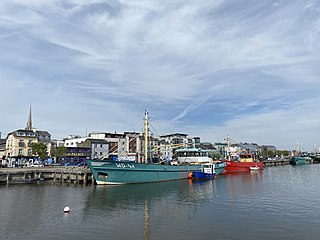
Wexford is the county town of County Wexford, Ireland. Wexford lies on the south side of Wexford Harbour, the estuary of the River Slaney near the southeastern corner of the island of Ireland. The town is linked to Dublin by the M11/N11 National Primary Route; and to Rosslare Europort, Cork and Waterford by the N25. The national rail network connects it to Dublin and Rosslare Europort. It had a population of 21,524 according to the 2022 census.

Eoin Colfer is an Irish author of children's books. He worked as a primary school teacher before he became a full-time writer. He is best known for being the author of the Artemis Fowl series. In September 2008, Colfer was commissioned to write the sixth instalment of the Hitchhiker's Guide to the Galaxy series, titled And Another Thing ..., which was published in October 2009. In October 2016, in a contract with Marvel Comics, he released Iron Man: The Gauntlet. He served as Laureate na nÓg between 2014 and 2016.
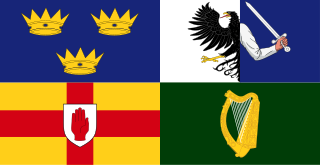
The history of Irish theatre begins in the Middle Ages and was for a long time confined to the courts of the Gaelic and "Old English" – descendants of 12th-century Norman invaders – inhabitants of Ireland. The first theatre building in Ireland was the Werburgh Street Theatre, founded in 1637, followed by the Smock Alley Theatre in 1662.
Professor Frank McGuinness is an Irish writer. As well as his own plays, which include The Factory Girls, Observe the Sons of Ulster Marching Towards the Somme, Someone Who'll Watch Over Me and Dolly West's Kitchen, he is recognised for a "strong record of adapting literary classics, having translated the plays of Racine, Sophocles, Ibsen, Garcia Lorca, and Strindberg to critical acclaim". He has also published six collections of poetry, and two novels. McGuinness was Professor of Creative Writing at University College Dublin (UCD) from 2007 to 2018.

Dervla Kirwan is an Irish actress. She has received a number of accolades, including two IFTA Awards for her performances in the film Ondine (2009) and the RTÉ thriller series Smother (2021–2023) respectively.
Events in the year 1965 in Ireland.
Events from the year 1949 in Ireland.
Conor McPherson is an Irish playwright, screenwriter and director of stage and film. In recognition of his contribution to world theatre, McPherson was awarded an honorary doctorate of literature in June 2013 by University College Dublin.
The Bush Theatre is located in the Passmore Edwards Public Library, Shepherd's Bush, in the London Borough of Hammersmith and Fulham. It was established in 1972 as a showcase for the work of new writers.
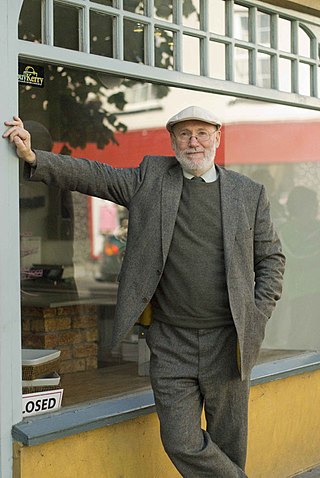
Dermot Bolger is an Irish novelist, playwright, poet and editor from Dublin, Ireland. Born in the Finglas suburb of Dublin in 1959, his older sister is the writer June Considine. Bolger's novels include Night Shift (1982), The Woman's Daughter (1987), The Journey Home (1990), Father's Music (1997), Temptation (2000), The Valparaiso Voyage (2001) and The Family on Paradise Pier (2005). He is a member of the artist's association Aosdána.

Wilson Milam is an American theatre director from Bellevue, Washington who works in the United States, UK and Ireland. He was nominated for a Tony Award for Best Director of a Play for Martin McDonagh's The Lieutenant of Inishmore as well as a Lucille Lortel nomination for his direction of Tracy Letts's Killer Joe.

Stuart Burge was an English stage and film director, actor and producer.
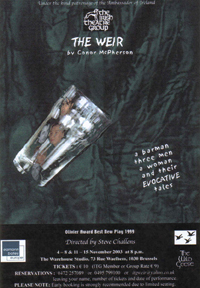
The Weir is a play written by Conor McPherson in 1997. It was first produced at The Royal Court Theatre Upstairs in London, England, on 4 July 1997. It opened on Broadway at the Walter Kerr Theatre on 1 April 1999. As well as several other locations in the UK and the U.S., the play has been performed in Ireland, Germany, the Czech Republic, Slovenia, Australia and Canada.
Stanley Townsend is an Irish actor.

Selskar Abbey is a ruined Augustinian abbey in Wexford, Ireland. Founded in the twelfth century, the abbey's full name was the Priory of St Peter and St Paul.
Robin Lefevre is a British theatre director. He has worked in Britain, Ireland, Australia, and the United States.
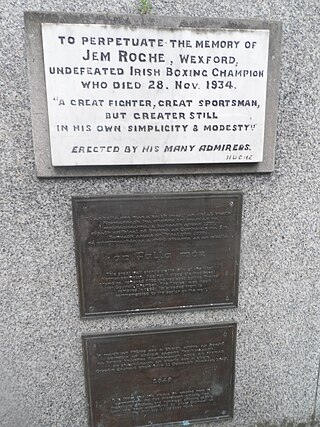
James "Jem" Roche was an Irish boxer and Gaelic football coach.

The Ballast Bank, situated in Wexford Harbour, Ireland, is a man made structure, built in 1832.
Amelia Crowley is an Irish actress and stand-up comedian. She is known for playing Fiona Piggott on RTÉ's Fair City, Deirdre Mallon in Derry Girls, and for her theatre work in the UK and Ireland.
References
- ↑ Billington, Michael (2007). "VIII Scenes From An Execution: 1979–90". State of the Nation: British Theatre since 1945. Faber and Faber. p. 318. ISBN 978-0-571-21034-3. OCLC 163616670.
was a young Irish actor-writer, Billy Roche, whose Wexford Trilogy at the Bush explored the cramping effects of small-town culture in minute, Chekhovian detail.